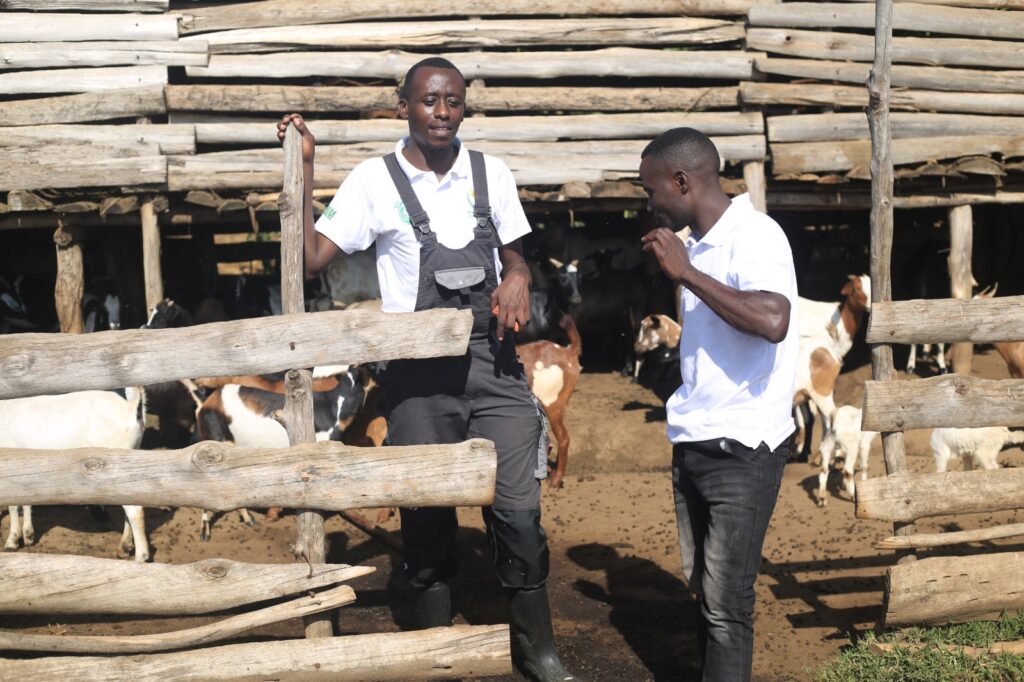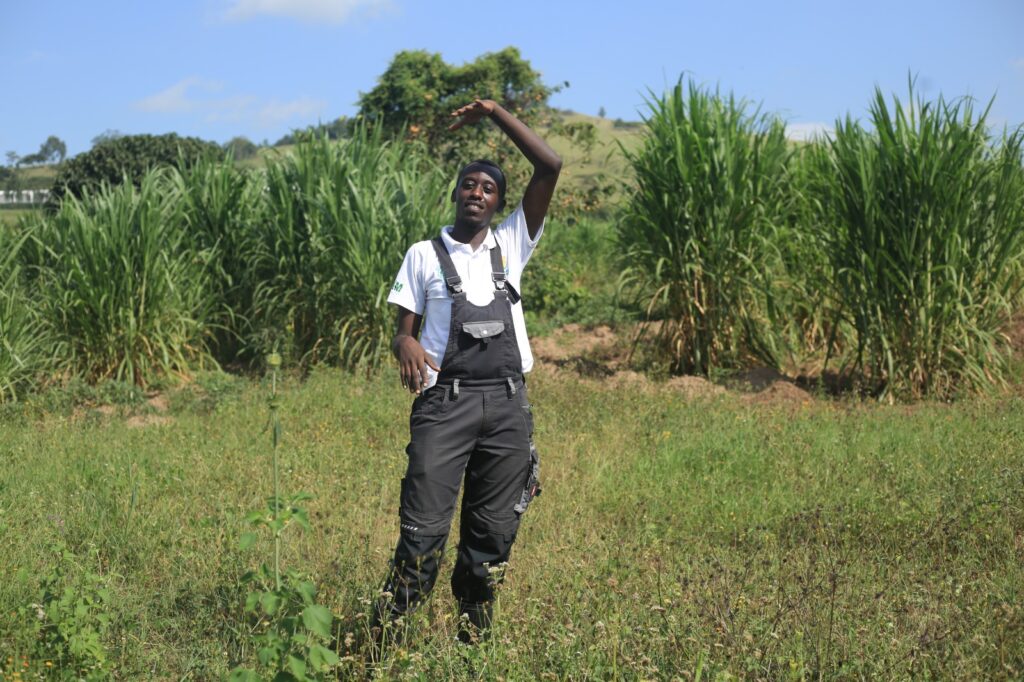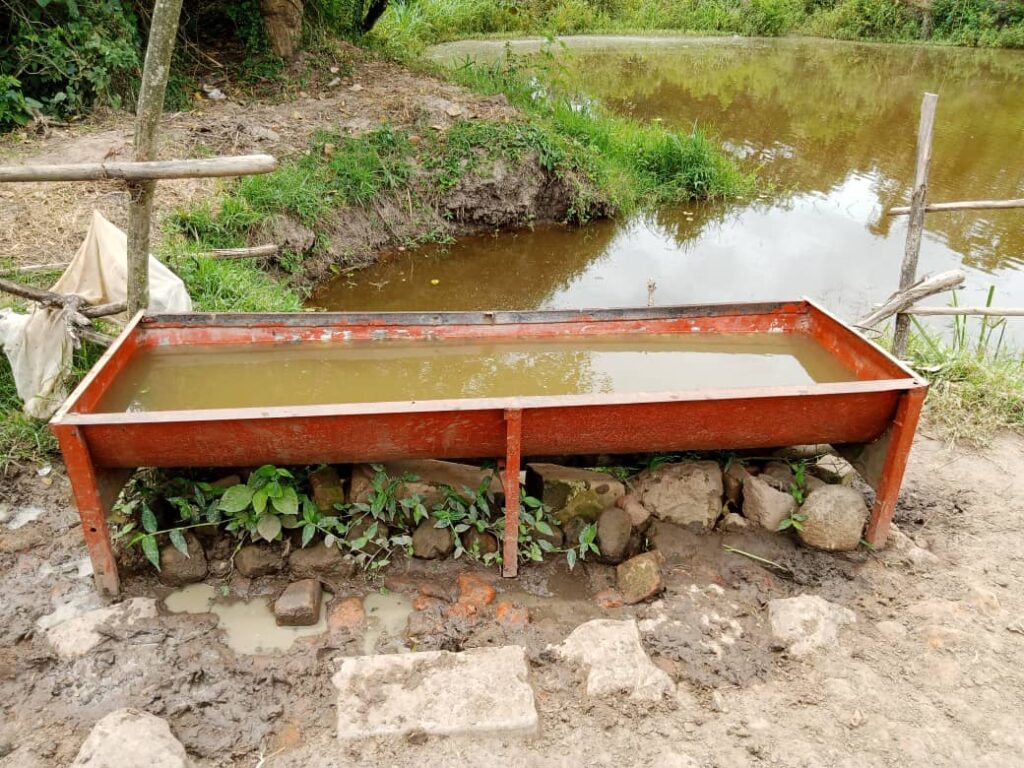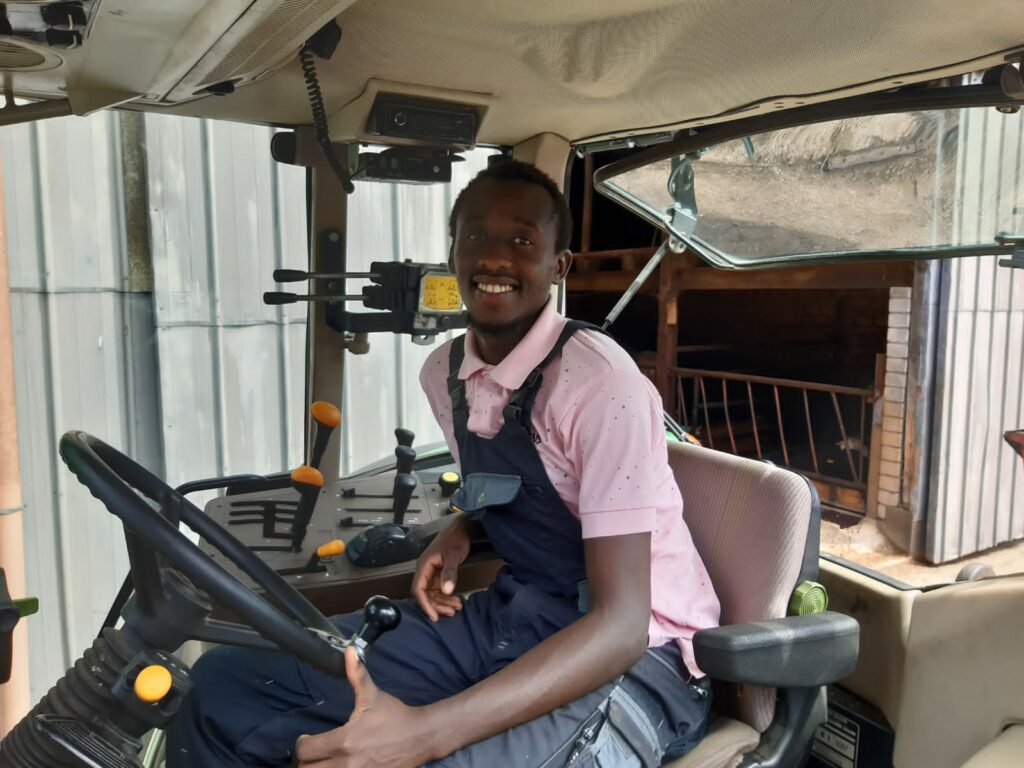By Ritah Mukasa
Seth Uwizeye Ruta, 29, looked for a job after graduation in vain. He then decided to go back home and utilise the family land for farming.
He ventured into goat rearing and after getting training from Germany, he specialised in dairy farming. Today, Ruta has 22 dairy cows and over 100 goats.
Ruta was born and raised on 150-acre family farm in Nyarubanga, Kakiika division in Mbarara city.
His family are cattle keepers, but they mainly kept the local Ankole breed on a farm that spans 150 acres.
However, much as Ruta had gained experience while growing up, he did not want to be a farmer but rather, an engineer.
He attended Kabaterine Primary School, St. Henry’s college Kitovu for O’level and Mengo SSS for A’level where he studied physics, mathematics and economics.
Unfortunately, he failed physics and he ended up doing a diploma in business administration at Makerere University Business School (MUBS) in 2014.
During his internship in the accounts department at Butabika hospital in 2014, his supervisor Patrick Okello, advised him to train as a nursing aid, but Uwizeye did not like it.
He instead resolved to be a job creator, not seeker.
Around the same time, while still at Butabika, Ruta attended church and one of the preachers, advised the congregation to keep life simple, think out of the box and start with something within their means.

Starting off
From that sermon, Ruta chose to take on farming which he was familiar with and a large part of the family land was idle.
But before he could draft a plan on how to start, one day, while at his auntie’s home in Kampala, he watched one of his neighbours’ matooke plantation in Mbarara being featured among the best on TV.
“I was challenged. It never crossed my mind that a normal plantation would take him that far,” Ruta shares.
The following weekend, he travelled to Mbarara and met him. He encouraged Ruta to take on matooke growing and offered him suckers.
“I travelled back to Kampala to look for money for labour. By that time, I was volunteering with the youth office at Namirembe Province,” he says adding that, “This work grew my social network. I would also save some of my allowances.”
Months later, Ruta collected sh2m and returned home to set up matooke plantation but before that, he talked to his mother and siblings about his plan and they all gave him a go-ahead. He began with two acres. He paid the workers sh100 to uproot each sucker from the neighbour’s plantation).
The neighbour offered him all the suckers he needed. He planted 450 suckers on each acre. The workers dug each pit at sh500.
Within a year, his first plantation had matured. He would sell to neighbours and matooke traders in Mbarara town.
“The proceeds helped me set up the second plantation,” he says. The second plantation sat on three acres.
On how he was supervising the work, Ruta said, he would travel home to count the suckers before paying.
“We had many fields trips to western Uganda at the province. I took advantage of the free transport,” he recalls.
On days when they had no trips, he used public transport and would spend a weekend in Mbarara. But also, his mother was always there to supervise the labourers.
“I fenced off the plantation and allowed some residents to cultivate beans from there to help maintain it,” he says.
“But I later discontinued them and mulched the plantation. I also pay an agronomist sh100,00 a month to look out for and manage pests infestations,” he says.
“On average, on a good season, I earn sh800, 000 from the plantation. I use the money to pay the agronomist, clear my tuition and maintenance,” he says.

Diversifying into goats
From matooke, Ruta scaled into goat rearing. He started with eight local goats. On one of his work errands with the church, he met a manager in Kabale district who had been gifted eight goats by his juniors, but couldn’t transport them to his home in Iganga district. He was stuck with them.
“We entered an agreement for me to rear them and after they multiply, we share the proceeds,” he calls.
Ruta took the animals to the farm in 2016. By 2018, they had multiplied to 76 goats, the challenges notwithstanding. For example, some goats died while others were stolen. There was a time he lost six goats.
“We decided to share. My partner took 40 and I remained with 30. He took more because he was the one paying the herdsman,” he says.
By 2019, Ruta’s farm had grown to 67 goats. He sold 23 of them at sh4.3m added to his savings of sh3m and went to Nakasongola and bought seven acres of land at sh7.2m. (He looked around for land in Mbarara and found that it was expensive. His cousin notified him about cheap land in Nakasongola. He had plans of shifting his farm there to be independent
“I wanted to plan ahead because the goats were multiplying fast. I did not want to depend on family land,” he says.
Towards the end of 2019, he started constructing a shelter for the goats in Nakasongola. He also hired two labourers and they planted maize on the six acres. However, one day, the neighbour’s cows invaded the maize and destroyed it.
The laborers killed one cow. The owner threatened to revenge and the labourers fled back to Busoga.
Worse still as Ruta was planning to shift his livestock, the COVID-19 lockdown struck and halted his plans.
By the time he returned to the farm after the lockdown, he found the shed had been destroyed by weather and termites. The barbed wire and fencing materials had been stolen.
He lost sh2.8m in that setback.
“I got discouraged and decided to concentrate on the farm in Mbarara since the lockdown was also on and off,” he recalls.
Uwizeye put the land on sale.

Training opportunity and specializing in dairy farming
To take you back a little, before graduation, Ruta bought a cow from their herdsman at sh800,000.
It had been gifted to him by Ruta’s parents in appreciation of the 25 years he had worked for the family. But he decided to sell it to Ruta who used his savings to pay for it in instalments over seven months. He continued saving and buying more Friesians. By 2020, he had seven.
Fast-forward to 2021, Ruta got a training opportunity in Germany under the International Farmers Exchange programme courtesy of the Young Farmers Federation Uganda.
He was there for three months but before leaving, he sold off 57 goats and left 12. He also sold five cows and left two. He banked the money and left his mother in charge of the plantation.
“I did not want to overload my mum with responsibilities because she also had her farm to supervise. I decided to sell and leave few animals, bank the money and resume when I return,” he recalls.
While in Germany, Ruta specialised in dairy farming and beef management. He was also trained in feeds mixing, operating machinery like milking machines and tractors.
Lessons learnt from Germany
Ruta says, farming in Uganda is different from that in Germany. For example, some farmers here are more attached to their animals than the money they get from them, but the Germans look at their bank accounts. In other words, if a cow is not making him money, it goes to the slaughterhouse even if it was gifted to him.
“That made sense to me. I discovered why those farmers are rich. That changed my perception towards commercial faming,” he says.
When Ruta returned home, he made it intentional to buy dairy cows to have more milk.
He also learnt that time is key and one has to work hard to grow their farm.
“At one farm we used to work for 14 hours. I was amazed by the amount of money we made,” he recollects.
Before, at his farm, they used to milk only once a day but when he returned, he changed to twice and since then, the profits have increased.
He also learnt a lot about good feeding and record keeping. He has three books; one for milk sales, security and treatment. He also keeps computer records.
Ruta adds that consistency is also important; specializing in one thing than doing many. For example, from matooke, he jumped on to cows and goats but in Germany, he realized that farmers specialize in one aspect and be good at it. Even if they diversify, they still do it in that area of specialization such that one aspect feeds into the other.
Meanwhile, when he returned in September, he withdrew the sh7million he had banked and added his savings from allowances. Ruta bought eight in calves, heifers and a bull.
Last year, he used the proceeds from the milk and bought more heifers. He had also bought more goats and these have multiplied to over 100. The Friesians are 22.
Ruta also enrolled on a bachelor of agribusiness and community development at Bishop Staurt University to enrich his knowledge.

Cost of production
So far, Ruta says, he sells 20 litres of milk daily at sh1, 500 each. This comes from five cows. He uses the proceeds to maintain the farm, treat the animals and pay the three herdsmen sh100,000 each monthly.
He also pays sh200,000 to the veterinary doctor and sh250,000 for security among others. He sells the milk to homes and shops and collects cash on delivery.
He says, being in town, the demand for milk is overwhelming.
“They like my milk for being fresh and clean. For example, if I inject a cow, I don’t sell the milk. I also deliver on time and consistently,” he says.
Additionally, every three months, Ruta sells a truck of cow dung at sh650,000.
“I don’t spend on water because we have a well in the farm. But I plan to scale up the farm to be more economically viable,” he says.
Challenges
Operating on a family farm (150 acres) is challenging because he shares it with other people and there are decisions and long-term investments he cannot take.
Labour is also a challenge. Ruta says, his herdsmen are unskilled and unstable. They cannot identify animal diseases and how to care for the sick ones. He also keeps hiring new ones because they keep going due to different reasons like looking for better pay or preferring to work from close to their families. He gets some from Eastern Uganda and others from Kabale and Rukungiri.
Also, veterinary doctors are few and busy. He now pays one, sh200, 000 every month to be available whenever he is needed. Before, he lost three cows due to East coast fever after the doctor responded late.
“It’s devastating to lose an animal you have raised for years but I learn from the loss and move on,” he says.
Another hiccup is security. Ruta used to lose goats to thieves until he recruited a guard whom he pays sh250, 000 every month.
“This area is also dry. Finding grass is not easy. I have resorted to hydroponics fodder and Napier which I supplement with maize,” he says.
On the pesticides, he says ticks become drug resistant yet the drugs are also expensive.
Plans
“Since Mbarara is now a city, I am saving to invest in Agro tourism; a model farm worth about sh500million. It will have eco-lodges and recreational facilities. The project will also provide jobs to the community. I am looking for a development partner,” he says.
What others say
Brenda Faith Qwera
Seth is passionate about farming especially dairy farming. He has a unique and admirable relationship with his cows. This explains why his farm keeps growing because he goes out of his way to see that he progresses. He makes our family proud and has inspired many young people.
Simon Abanyu, bee farmer
It is hard to find a good farm in town like the one Seth has. I have visited him many times and admired his business. His cows are healthy and well looked after. No wonder they fetch him good money. I was surprised to learn that his bull cost sh4million and a female, sh4.8million. I wish him all the best.
Godfrey Kioko-Farming consultant
Seth is one of the few farmers who have embraced hydroponic climate smart farming. It has really helped him to feed his cows and goats. Before that, he used to struggle with grass since a big part of his farm is dry.





